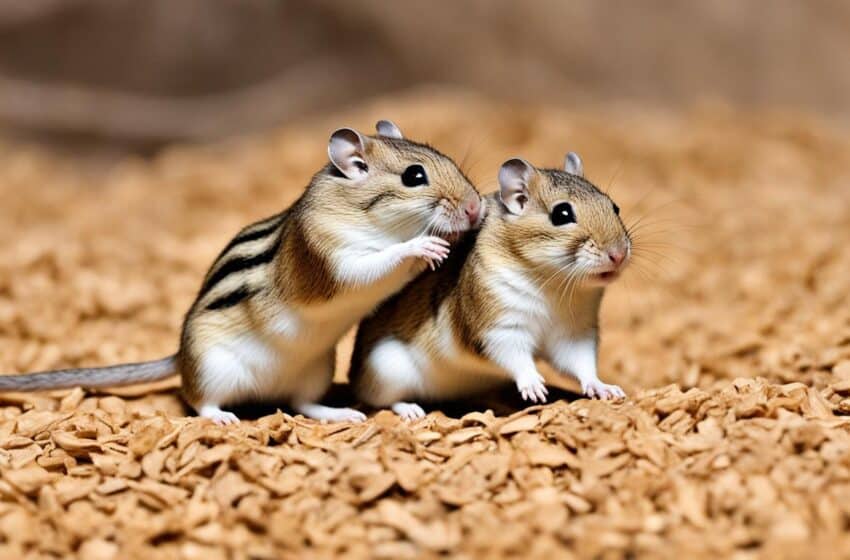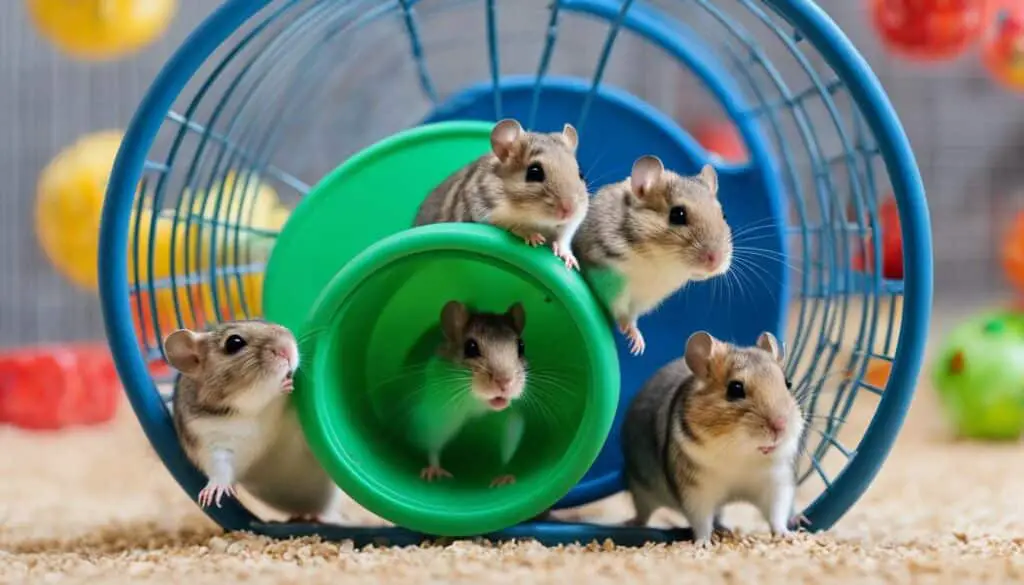Understanding Gerbil Behavior: An Owner’s Guide

Welcome to “Understanding Gerbil Behavior: An Owner’s Guide,” where I’ll provide you with valuable insights into caring for your beloved gerbil. Gerbils are delightful pets that bring joy and companionship to our lives. To ensure their well-being, it’s crucial to understand their unique behavior and provide them with appropriate care. In this guide, we’ll explore various aspects of gerbil care, including feeding, handling, cage cleaning, exercise, socialization, grooming, and common illnesses.
Key Takeaways:
- Gerbils are easy to care for and make fun companions.
- Feeding gerbils involves a combination of pellet/seed gerbil food and small amounts of fresh fruits and vegetables.
- Handle gerbils gently, allowing them time to adjust to their new home before attempting to pick them up.
- Gerbil cages should be kept clean, with bedding changed at least once a month.
- Provide gerbils with regular exercise and socialization to keep them healthy and happy.
Now that we’ve covered the introduction, let’s dive deeper into the world of gerbil care and explore the best practices for each aspect of their well-being.
Feeding and Handling Gerbils
Feeding and handling gerbils is an essential part of caring for these small and curious creatures. By providing them with nutritious food and handling them gently, you can ensure their well-being and build a strong bond with your gerbil.
Feeding Gerbils
When it comes to gerbil feeding, a balanced diet is crucial for their overall health. It is recommended to feed them a combination of pellet/seed gerbil food and small amounts of fresh fruits and vegetables. The commercial gerbil food provides essential nutrients and should form the basis of their diet, while the fresh fruits and vegetables offer additional vitamins and minerals.
Did You Know? Gerbils have specific dietary requirements and cannot metabolize certain foods. Avoid feeding them chocolate, citrus fruits, rhubarb, garlic, onions, and high-fat or sugary foods.
Water is also vital for gerbils, and fresh water should be provided at all times. Use a water bottle or a small dish that cannot be easily knocked over to ensure a constant supply of clean water.
| Gerbil Food | Fresh Food |
|---|---|
| Pellet/seed gerbil food | Small amounts of fresh fruits and vegetables |
| Provides essential nutrients | Offers additional vitamins and minerals |
Handling Gerbils
Handling gerbils requires patience and gentle approach. Give them time to adjust to their new environment before attempting to pick them up. It’s important to approach them slowly and get them accustomed to your presence.
Important Tip: Never grab a gerbil by its tail. Gerbils can easily injure their tail if it is pulled or twisted. Instead, scoop them up by gently cupping your hands around their body, supporting their weight.
Observing your gerbil’s behavior is crucial during handling. If your gerbil shows signs of fear or stress, such as biting, squeaking, or aggressive behavior, it’s best to leave them alone and try again later. It’s also important to be aware of any signs of illness, such as lethargy, loss of appetite, or changes in fur condition, as these may require prompt veterinary attention.

Remember, gerbil feeding and handling are important aspects of their care. By providing a balanced diet and handling them gently, you can ensure a happy and healthy life for your gerbil.
Cage Cleaning and Location
Gerbils are known for their cleanliness, but proper cage cleaning is still essential for their well-being. Regular maintenance helps maintain a healthy gerbil habitat and ensures a comfortable living environment for your furry friends.
Cage Cleaning
To keep your gerbil’s cage clean, it’s important to remove soiled bedding promptly. Spot cleaning should be done daily, removing any soiled areas and replacing them with fresh bedding. This helps prevent odors and keeps the cage hygienic.
Additionally, it is recommended to change the entire bedding at least once a month. This ensures proper cleanliness and prevents the buildup of bacteria or unwanted pests. By maintaining a clean cage, you provide a healthy living space for your gerbils.
Cage Location
The location of the gerbil cage plays a significant role in their overall well-being. When choosing a spot, keep the following considerations in mind:
- The cage should be kept indoors to protect your gerbils from extreme weather conditions, predators, and other hazards.
- Place the cage in a room with a temperature between 65℉ and 75℉. Gerbils are sensitive to temperature changes, so maintaining a consistent and comfortable environment is important for their health.
- Avoid placing the cage in direct sunlight. Too much heat and exposure to sunlight can cause discomfort and overheating for gerbils.
- Keep the gerbil cage away from other animals that may disturb or stress your gerbils. This helps promote a peaceful and safe environment for them.
Considering the nocturnal behavior of gerbils, it’s advisable to keep their cage out of the bedroom. Gerbils are naturally active during the night, and their nocturnal activities, such as digging and running on exercise wheels, may disrupt your sleep. Placing the cage in a quiet area of your home will ensure everyone gets the rest they need.
| Key Points | Benefits |
|---|---|
| Regular cage cleaning | – Promotes hygiene and prevents odors – Prevents the buildup of bacteria and pests |
| Changing bedding monthly | – Ensures cleanliness and comfort – Reduces the risk of illness |
| Indoor location of the cage | – Protects gerbils from extreme weather conditions and predators – Provides a controlled environment |
| Room temperature between 65℉ and 75℉ | – Maintains a comfortable climate for gerbils – Prevents temperature-related health issues |
| Away from direct sunlight | – Prevents overheating and discomfort – Protects gerbils from harmful UV radiation |
| Away from other animals | – Reduces stress and potential conflicts – Maintains a peaceful environment |
| Away from the bedroom | – Ensures uninterrupted sleep – Prevents disturbances caused by nocturnal gerbil activities |
Exercise and Socialization for Gerbils
Gerbils are active creatures that require regular exercise to maintain good health and happiness. In this section, I will discuss the importance of exercise for gerbils and how to provide them with opportunities for physical activity. Additionally, I will explore the social nature of gerbils and the benefits of companionship for their overall well-being.
The Importance of Gerbil Exercise
Regular exercise is crucial for gerbils as it helps prevent obesity, promotes cardiovascular health, and stimulates their natural instincts. Engaging in physical activities allows gerbils to expend energy, explore their environment, and maintain healthy muscle tone.
One effective way to provide gerbils with exercise is to create an escape-proof enclosure outside of their cage. This can be a playpen or a secure area in your home where they can safely roam and explore. Supervised exercise sessions of at least 20 minutes a day will allow gerbils to stretch their legs and engage in playful behavior.
When designing an exercise area for your gerbil, make sure to remove any potential hazards, such as electrical cords or poisonous plants. Provide stimulating objects like tunnels, ramps, and toys to encourage active movement and mental stimulation.
Socialization and Companionship
Gerbils are social animals and thrive when they have companions of their own kind. Providing your gerbil with a same-sex companion is essential for their well-being. When introducing new gerbils, it’s important to follow a slow and careful process to ensure a successful bond.
“Gerbils are naturally social animals and having a companion helps them feel secure and content,” says Dr. Jane Smith, a veterinarian specializing in small pets.
“When gerbils are housed alone for extended periods, they can experience loneliness and stress, which can lead to behavioral issues and a decline in their overall health.”
When introducing new gerbils, it’s best to do so when they are young and before they develop strong territorial behavior. Place the new gerbil in a separate cage within sight and smell of the existing gerbil(s). Allow them to get used to each other’s presence for a few weeks before attempting direct interaction.
“During the introductory period, it’s important to monitor their behavior closely,”
advises Dr. Smith.
“Look for signs of aggression, such as biting or excessive chasing. If any aggressive behavior occurs, separate them immediately and consult a veterinarian or a gerbil behavior specialist for guidance.”
Once the gerbils show signs of tolerance and curiosity towards each other, you can gradually introduce them in a neutral territory for short supervised interactions. It’s essential to provide multiple hiding places and separate food and water sources to avoid potential conflicts.
In summary, gerbils require regular exercise to thrive physically and mentally. Creating a safe, escape-proof exercise area outside of their cage is essential for their overall well-being. Additionally, providing gerbils with same-sex companionship offers them social interaction and a sense of security. Gerbil exercise and socialization are important aspects of responsible gerbil care.

Common Gerbil Health Issues and Care
Gerbils, like any other pets, can experience health issues from time to time. As a responsible gerbil owner, it’s essential to monitor your pet’s health closely and seek veterinary care if you notice any signs of illness. Some of the common health issues to watch out for in gerbils include difficulty breathing, frequent sneezing, discharge from the eyes, nose, or mouth, unexplained weight loss, and overgrown teeth.
If you observe any of these symptoms in your gerbil, it’s crucial to consult a veterinarian who specializes in small animals or exotic pets, as they have the expertise and experience to diagnose and treat gerbil health issues. Prompt veterinary care can help identify and address underlying problems early, increasing the chances of a successful recovery for your furry friend.
In addition to veterinary care, regular grooming is important for maintaining the overall health and well-being of gerbils. These small rodents are naturally clean animals, but they still require some assistance to keep themselves clean. Gerbil grooming involves providing them with a sand bath that allows them to maintain proper hygiene by removing excess oils and dirt from their fur. Additionally, grooming may also include nail trimming if the gerbil’s nails become overgrown, as this can cause discomfort or potential injury.
By staying vigilant about your gerbil’s health, seeking appropriate veterinary care, and ensuring regular grooming, you can help your furry companion lead a happy and healthy life.
FAQ
How often should I feed my gerbil?
It is recommended to provide a combination of pellet/seed gerbil food and small amounts of fresh fruits and vegetables. Make sure to provide fresh water at all times.
How should I handle my gerbil?
Gently handle your gerbil, giving them time to adjust to their new home before attempting to pick them up. Avoid grabbing their tail and be aware of signs of illness.
How often should I clean my gerbil’s cage?
Soiled bedding should be removed promptly and the entire bedding should be changed at least once a month. Regular cleaning is necessary to maintain a clean environment for your gerbil.
Where should I place my gerbil’s cage?
Keep the gerbil cage indoors, in a room with a temperature between 65℉ and 75℉. Place it away from direct sunlight and other animals that may disturb the gerbil. It’s recommended to keep the cage out of the bedroom to manage their nocturnal behavior.
How much exercise do gerbils need?
Gerbils need regular exercise to stay healthy and happy. Once they are hand-trained, you can take them out of their cage for supervised exercise in an escape-proof enclosure for 20 minutes a day.
Should I get a companion for my gerbil?
Gerbils are social animals and do well with the company of other gerbils. It is recommended to pair them with a same-sex companion for their well-being.
What are some common health issues in gerbils?
Common health issues in gerbils include difficulty breathing, sneezing, discharge from the eyes, nose, or mouth, weight loss, and overgrown teeth. Keep an eye on your gerbil’s health and seek veterinary care if any signs of illness are observed.
How do I groom my gerbil?
Gerbils groom themselves, but regular grooming is necessary to keep them clean. Providing a sand bath helps them maintain proper hygiene. Nail trimming may also be required if the nails become overgrown.



